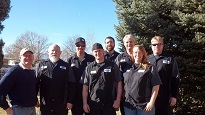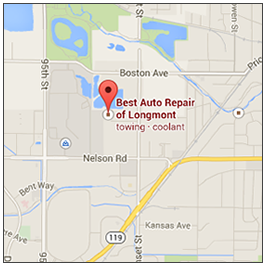 Each manufacturer of replacement brake pads offers a wide selection so choosing which to go with can be confusing. In a 2014 review of replacement brake pads by Consumer Reports, upgraded or severe-duty pads were only recommended “if you tow, carry heavy loads or numerous passengers often, live in hilly or mountainous areas, or have a daily commute down a steep grade”. While price and performance or important considerations, choosing certified replacement brake pads, like NAPA’s line offered at Best Auto Repair in Longmont, is the most important factor.
Each manufacturer of replacement brake pads offers a wide selection so choosing which to go with can be confusing. In a 2014 review of replacement brake pads by Consumer Reports, upgraded or severe-duty pads were only recommended “if you tow, carry heavy loads or numerous passengers often, live in hilly or mountainous areas, or have a daily commute down a steep grade”. While price and performance or important considerations, choosing certified replacement brake pads, like NAPA’s line offered at Best Auto Repair in Longmont, is the most important factor.
Types of Brake Pads
Semimetallic: Pros of this type of pad are their durability and heat transfer; cons are that they tend to wear down rotors more quickly and may not do as well at lower temperatures, and can also be noisy. Semimetallic brake pads are mad up of inorganic fillers, friction modifiers and 30-65% metal, which could be graphite, copper, iron powder or chopped steel wool
Low-metallic NAO: These pads only contain 10-30% metal (usually copper or steel) mixed with organic matter. The metal component increases brake performance and heat transfer, but creates more dust and noise as well.
Nonasbestos Organic: Also known as just organic or NAO, this type contains glass, rubber or carbon fibers mixed with high-temp resins and other filler components. Being softer, they are quieter but also wear faster and create more dust.
Ceramic: The most expensive kind of brake pad because they are cleaner, quieter, don’t accelerate rotor wear and offer optimal braking performance. As you probably guessed, ceramic pads are made of ceramic fibers, bonding agents, nonferrous filler and maybe a bit of metal.
According to Consumer Reports, it’s most important to look for certified replacement pads; the most expensive or upgraded options may not be the best choice for your vehicle and driving habits. The Dual Dynamometer Differential Effectiveness Analysis, or D3EA, is voluntary, conducted by an independent laboratory and the hardest certification to receive. NAPA was among only three other companies to pass the stringent D3EA test when it was first introduced in 1996!
From now through June, Best Auto Repair is offering $50 off qualifying NAPA brake products– so if your brakes are squealing, make an appointment today to take advantage of this great deal!


 720.652.7272
720.652.7272

